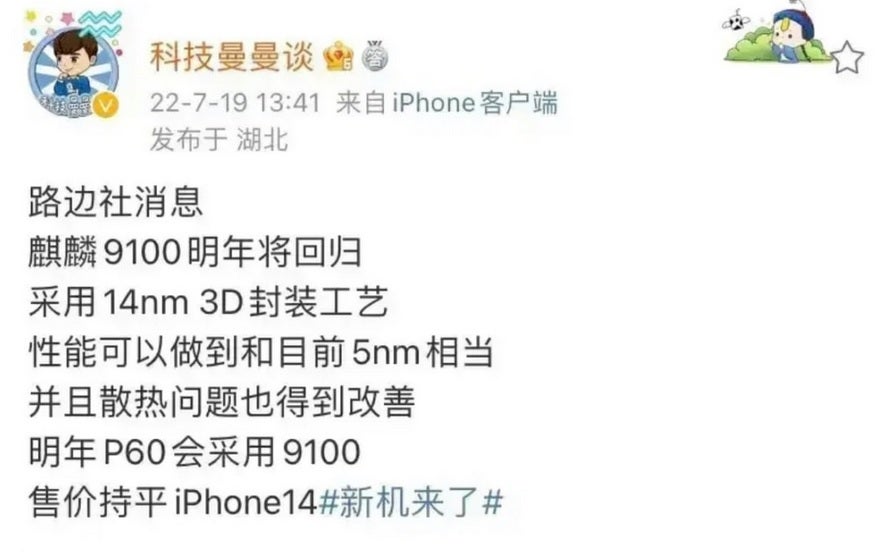Wild rumor has Huawei using a 14nm Kirin 9100 chip for 2023 P60 flagship

Thanks to the United States, Huawei is no longer the smartphone powerhouse that it once was. Just a few years ago, the Chinese manufacturer was poised to become the world's largest smartphone manufacturer. But after being placed on the Entity List in 2019 by the U.S., the company could no longer access its U.S. supply chain which prevented it from doing business with some of its important suppliers including Google.
Exactly one year later to the day, a change in U.S. export rules made matters worse for Huawei since it prevented the company from obtaining cutting-edge chipsets from foundries that use American technology. These new export rules would prevent Huawei from replenishing its supplies of the latest chips after using up its inventory. In order to prevent these U.S. bans from taking its Honor sub-unit down with it, Huawei sold the unit two years ago for over $15 billion.
Huawei has been unable to produce 5G handsets thanks to the U.S. ban
Unable to obtain cutting-edge chips with 5G support for its flagship P50 phone released last year, Huawei used a 4G-only version of the Snapdragon 888 chipset. Having said that, it was manufactured using the 5nm process node meaning that the chip had a large number of transistors inside allowing it to deliver strong performance and energy efficiency. The lower the process node, the higher the number of transistors that can fit inside a chip.

Tipster posts wild rumor about the chipset to be used on the Huawei P60 series
With this in mind, according to Huawei Central, a tipster has posted an interesting rumor on China's Weibo social media site about the next iteration of the photography-based P-series flagship series. The tipster says that the 2022 P60 handsets will be powered by a 14nm Kirin 9100 chip. The Kirin chips are designed by Huawei's HiSilicon unit and at one time, before the U.S. took the air out of Huawei's balloon, Huawei was the second-largest TSMC customer after Apple.
Despite being produced with a 14nm process node, the tipster adds that the performance of the Kirin 9100 chip will be comparable to a 5nm chipset. Huawei hasn't commented on the rumor. We would suggest taking this rumor with a grain of salt. There is no way a 14nm chipset can deliver 5nm performance. As a comparison, Samsung's version of the A9 chip used on the 2015 iPhone 6s and iPhone 6s Plus used Samsung's 14nm process node which contained 2 billion transistors. Compare that to Apple's current 5nm A15 Bionic which carries 15 billion transistors.
The rumor also doesn't mention whether the 14nm Kirin 9100 will support 5G although that also seems impossible, The only reason we could see Huawei employing a 14nm chipset on a new flagship is to take back some control over the production of its own integrated circuits.
Some Mate 50 Pro units will be powered by a 4G-only Snapdragon 8 Plus Gen 1 chipset
The latest word is that the Mate 50 series will be unveiled as soon as next month. Thanks to the U.S. ban, instead of releasing two flagships each year (the P-series and Mate-series), Huawei has decided to release just one flagship phone every year alternating between the P-series and the Mate-series models. With the P50 released last year, the Mate 50 is expected in 2022 and could be unveiled as soon as next month.
The high-end version of the Mate 50 Pro will reportedly be powered by a 4G-only version of the Snapdragon 8+ Gen 1 chipset. Other models will feature the 4G-only Snapdragon 8 Gen 1 chip while the Mate 50 RS will carry the Kirin 9000S chip. The series is expected to have Harmony OS 3.0 pre-installed.
Huawei no longer ranks in the top five global smartphone manufacturers. In 2019, the company delivered 240.6 million phones. One report had the firm shipping only 35 million phones last year due to the U.S. ban and the sale of Honor. That was an 81% decline year-over-year.
Can Huawei make a comeback? It is going to require the U.S. to pull its hands away from Huawei's throat which is something we do not see happening over 16 months into a new administration that apparently shares the same view on Huawei as the preceding one.










Things that are NOT allowed: